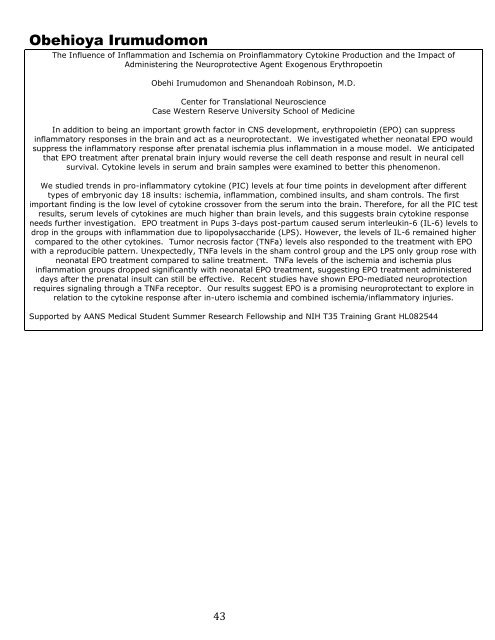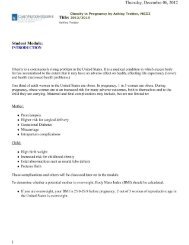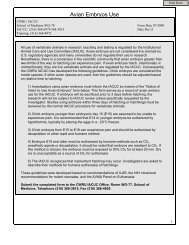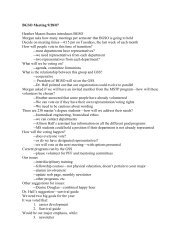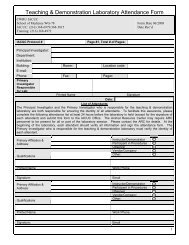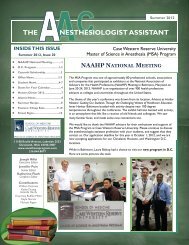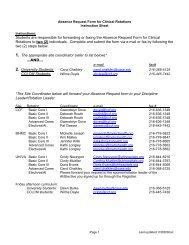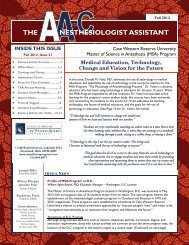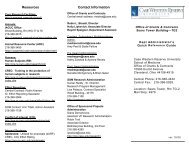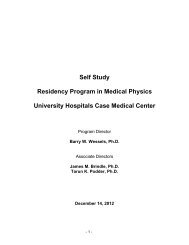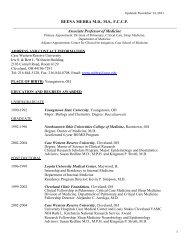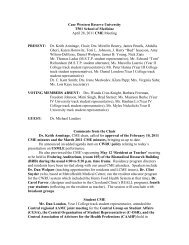student research day - Case Western Reserve University School of ...
student research day - Case Western Reserve University School of ...
student research day - Case Western Reserve University School of ...
You also want an ePaper? Increase the reach of your titles
YUMPU automatically turns print PDFs into web optimized ePapers that Google loves.
Obehioya Irumudomon<br />
The Influence <strong>of</strong> Inflammation and Ischemia on Proinflammatory Cytokine Production and the Impact <strong>of</strong><br />
Administering the Neuroprotective Agent Exogenous Erythropoetin<br />
Obehi Irumudomon and Shenandoah Robinson, M.D.<br />
Center for Translational Neuroscience<br />
<strong>Case</strong> <strong>Western</strong> <strong>Reserve</strong> <strong>University</strong> <strong>School</strong> <strong>of</strong> Medicine<br />
In addition to being an important growth factor in CNS development, erythropoietin (EPO) can suppress<br />
inflammatory responses in the brain and act as a neuroprotectant. We investigated whether neonatal EPO would<br />
suppress the inflammatory response after prenatal ischemia plus inflammation in a mouse model. We anticipated<br />
that EPO treatment after prenatal brain injury would reverse the cell death response and result in neural cell<br />
survival. Cytokine levels in serum and brain samples were examined to better this phenomenon.<br />
We studied trends in pro-inflammatory cytokine (PIC) levels at four time points in development after different<br />
types <strong>of</strong> embryonic <strong>day</strong> 18 insults: ischemia, inflammation, combined insults, and sham controls. The first<br />
important finding is the low level <strong>of</strong> cytokine crossover from the serum into the brain. Therefore, for all the PIC test<br />
results, serum levels <strong>of</strong> cytokines are much higher than brain levels, and this suggests brain cytokine response<br />
needs further investigation. EPO treatment in Pups 3-<strong>day</strong>s post-partum caused serum interleukin-6 (IL-6) levels to<br />
drop in the groups with inflammation due to lipopolysaccharide (LPS). However, the levels <strong>of</strong> IL-6 remained higher<br />
compared to the other cytokines. Tumor necrosis factor (TNFa) levels also responded to the treatment with EPO<br />
with a reproducible pattern. Unexpectedly, TNFa levels in the sham control group and the LPS only group rose with<br />
neonatal EPO treatment compared to saline treatment. TNFa levels <strong>of</strong> the ischemia and ischemia plus<br />
inflammation groups dropped significantly with neonatal EPO treatment, suggesting EPO treatment administered<br />
<strong>day</strong>s after the prenatal insult can still be effective. Recent studies have shown EPO-mediated neuroprotection<br />
requires signaling through a TNFa receptor. Our results suggest EPO is a promising neuroprotectant to explore in<br />
relation to the cytokine response after in-utero ischemia and combined ischemia/inflammatory injuries.<br />
Supported by AANS Medical Student Summer Research Fellowship and NIH T35 Training Grant HL082544<br />
43


